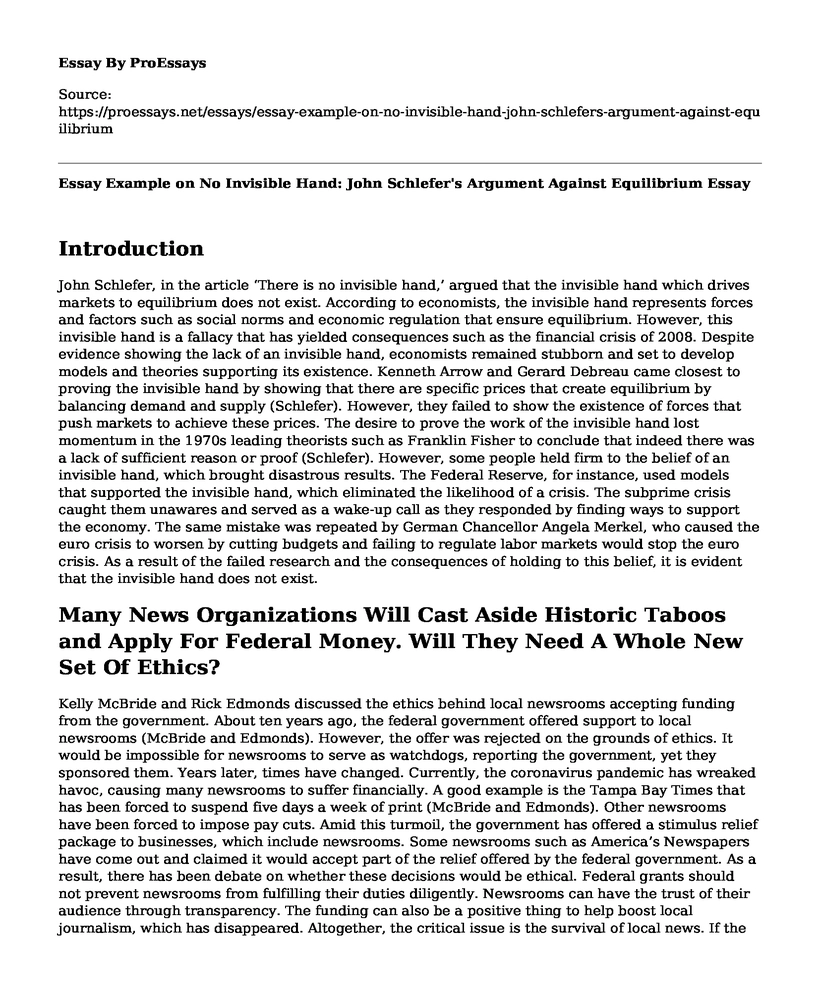Introduction
John Schlefer, in the article ‘There is no invisible hand,’ argued that the invisible hand which drives markets to equilibrium does not exist. According to economists, the invisible hand represents forces and factors such as social norms and economic regulation that ensure equilibrium. However, this invisible hand is a fallacy that has yielded consequences such as the financial crisis of 2008. Despite evidence showing the lack of an invisible hand, economists remained stubborn and set to develop models and theories supporting its existence. Kenneth Arrow and Gerard Debreau came closest to proving the invisible hand by showing that there are specific prices that create equilibrium by balancing demand and supply (Schlefer). However, they failed to show the existence of forces that push markets to achieve these prices. The desire to prove the work of the invisible hand lost momentum in the 1970s leading theorists such as Franklin Fisher to conclude that indeed there was a lack of sufficient reason or proof (Schlefer). However, some people held firm to the belief of an invisible hand, which brought disastrous results. The Federal Reserve, for instance, used models that supported the invisible hand, which eliminated the likelihood of a crisis. The subprime crisis caught them unawares and served as a wake-up call as they responded by finding ways to support the economy. The same mistake was repeated by German Chancellor Angela Merkel, who caused the euro crisis to worsen by cutting budgets and failing to regulate labor markets would stop the euro crisis. As a result of the failed research and the consequences of holding to this belief, it is evident that the invisible hand does not exist.
Many News Organizations Will Cast Aside Historic Taboos and Apply For Federal Money. Will They Need A Whole New Set Of Ethics?
Kelly McBride and Rick Edmonds discussed the ethics behind local newsrooms accepting funding from the government. About ten years ago, the federal government offered support to local newsrooms (McBride and Edmonds). However, the offer was rejected on the grounds of ethics. It would be impossible for newsrooms to serve as watchdogs, reporting the government, yet they sponsored them. Years later, times have changed. Currently, the coronavirus pandemic has wreaked havoc, causing many newsrooms to suffer financially. A good example is the Tampa Bay Times that has been forced to suspend five days a week of print (McBride and Edmonds). Other newsrooms have been forced to impose pay cuts. Amid this turmoil, the government has offered a stimulus relief package to businesses, which include newsrooms. Some newsrooms such as America’s Newspapers have come out and claimed it would accept part of the relief offered by the federal government. As a result, there has been debate on whether these decisions would be ethical. Federal grants should not prevent newsrooms from fulfilling their duties diligently. Newsrooms can have the trust of their audience through transparency. The funding can also be a positive thing to help boost local journalism, which has disappeared. Altogether, the critical issue is the survival of local news. If the newsrooms disregard the federal relief, it could mean the end for some. Therefore, newsrooms must accept government help to ensure their survival.
Questions
- If markets are not led by an invisible hand, what controls them? How is market equilibrium and stability attained?
- In utilitarian ethics, the consequences of an action determine whether it is right or wrong. In this case, what would be the consequences of local newsrooms taking federal grants? As a result of the consequences, would it be ethical?
- If local newsrooms agreed to take federal grants, who should be given the mandate of allocating funds? Would there be equal distribution of funds among newsrooms?
Works Cited
McBride, Kelly, and Rick Edmonds. ‘Many News Organizations Will Cast Aside Historic Taboos and Apply For Federal Money. Will They Need A Whole New Set Of Ethics?’ Poynter, 3 April 2020, www.poynter.org/ethics-trust/2020/many-news-organizations-will-apply-for-federal-money-is-this-the-first-step-to-government-support-for-local-news/. Accessed 18 June 2020.
Schlefer, Jonathan. ‘There Is No Invisible Hand.’ Harvard Business Review, 10 April 2020, https://hbr.org/2012/04/there-is-no-invisible-hand. Accessed 18 June 2020
Cite this page
Essay Example on No Invisible Hand: John Schlefer's Argument Against Equilibrium. (2023, Sep 04). Retrieved from https://proessays.net/essays/essay-example-on-no-invisible-hand-john-schlefers-argument-against-equilibrium
If you are the original author of this essay and no longer wish to have it published on the ProEssays website, please click below to request its removal:
- Essay Sample on How Can HR Make A Strategic Contribution To This Organization?
- Organization's Business Model of Walgreen Company Paper Example
- Tech Transforming Financial & Banking: Secure Payments, Efficiency & Quality - Essay Sample
- Ending Inventory & Cost of Goods Sold: Detailed Analysis - Essay Sample
- Essay Example on Forge Strong Relationships With Clients: Tips & Tricks
- Industrial Psychology: Enhancing Workplace Disputes Since 1930s - Essay Sample
- Team Dynamics and Organizational Success: Achieving Goals Through Teamwork







